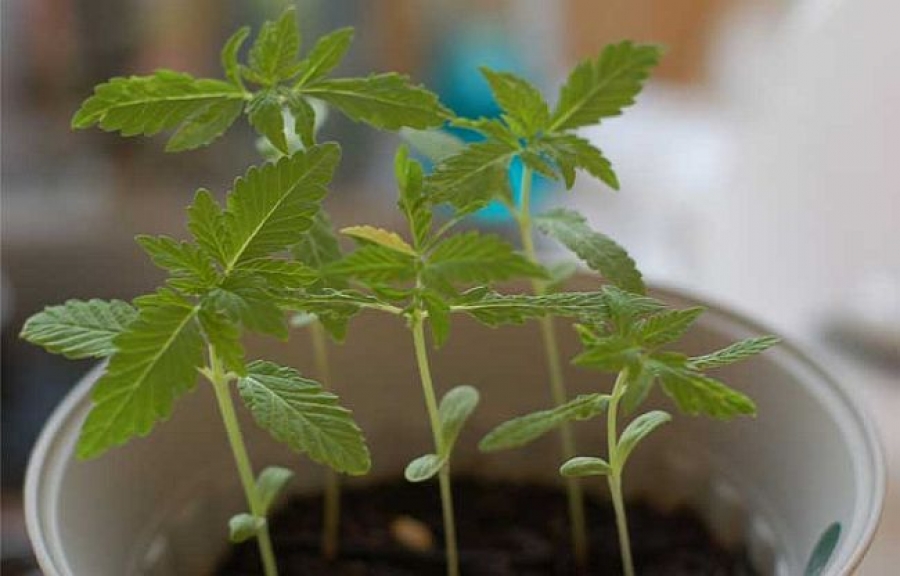Later this year, Canada plans to legalize marijuana for recreational purposes. Legislation is working its way through the House of Commons, but individual provinces are responsible for specific regulations, including whether residents will be allowed to grow their own cannabis plants at home.
Quebec and Manitoba have already said no. Ontario, Nova Scotia and the Northwest Territories will allow it. Four plants are the maximum allowed according to the federal legislation. In B.C. and the Yukon, plants can't be visible from a public space. In New Brunswick they must be in a locked room or box.
Alberta, Saskatchewan and Nunavut may allow landlords to have a say in whether plants will be allowed in rental units. Newfoundland and Labrador and Prince Edward Island have yet to decide what to do about the issue.
"In recent weeks we have seen Ottawa Public Health as well as apartment owners and landlords speak publicly about the challenges the Canadian Real Estate Association (CREA) raised over a year ago with government officials. Namely, growing cannabis at home poses huge problems for the health and safety of people and buildings," says Michael Bourque, CEO of CREA, in an op-ed article published in the National Post.
"Risks associated with regular growing of cannabis include mould, spores and fungus. People living in these surroundings with any type of respiratory illness could be adversely affected. And the damage to the home or apartment is well known to REALTORS who have encountered grow-ops across the country," says Bourque.
A recent report by the National Collaborating Centre for Environmental Health identified several environmental health risks associated with growing pot at home: access and accidental poisoning, indoor air quality, inappropriate use of pesticides, and electrical, fire and radiation hazards.
"The presence of cannabis plants, products and waste in the home increases the risk that children, pets or unaware adults may inadvertently consume cannabis with detrimental effects," says the report, which was written by Angela Eykelbosh and Leela Steiner. They say the effects of cannabis intoxication on children range "from lethargy and ataxia to tachycardia, hypoventilation, coma and seizure".
The authors say several studies "have shown a clear relationship between decriminalization (or transition toward decriminalization) and the increasing frequency of cannabis poisonings."
On indoor air quality, the authors say growers often boost the relative humidity with misting or humidifiers to support young plants before their root systems become established. Mature cannabis plants produce five to seven times the amount of water vapour as an average-sized house plant, also contributing to humidity issues and the risk of mould.
Cannabis is also smelly when it's flowering or being dried and cured. "To date, there is no evidence to suggest that cannabis odours are specifically detrimental to human health, however, as with any strong odour, it can be argued that odour itself impacts well-being through annoyance, disruption and stress," say Eykelbosh and Steiner.
One solution to the mould and humidity problem would be to grow the plants outside. Some provinces will allow this, but it "increases the risk of theft and may exacerbate odour issues," says the study. "A second option is to allow or encourage growth in secure, non-attached structures on the same property, which would also allow for the installation of odour-control technology, if necessary."
Some pesticides that are used on food crops are dangerous if used on products that are smoked. For example, myclobutanil, sold under the trade names of Nova 40W and Eagle 20 in Canada, may not be completely combusted when the cannabis is smoked, and the remaining residue or combustion products can then be absorbed through the lungs.
The authors also say that cannabis grow equipment is an electrical and fire risk. "High-wattage grow lamps (500 -- 1000 W) produce enough heat to cause serious burns, and draw large amounts of power that, in addition to other grow equipment, increase the risk of shocks and overloads, leading to fires." Other fire hazards include the presence of fertilizers, compressed gas and dried plant material, they say. "Because of these and other physical and structural hazards, home grows are considered more risky to first responders than typical residential fires and presumably also to occupants in need of rescue."
Illegal cannabis processing is also a concern, say the authors. For example, producing hash oil using butane or other organic solvents is a particular concern, because the process can cause a powerful explosion. Radiation hazards from ultraviolet lights can result in skin and eye damage, depending on the amount of time they are used and whether shielding or personal protective equipment is used.
One potential solution to all these issues may be the development of "grow your own" products -- fully enclosed hydroponic grow systems that automatically regulate growing conditions for the plants, while sealing in humidity and odour. They can also be locked. These units are currently being sold for $1,500 to $2,500.
Bourque says that "it's pretty clear that Canada has the production capacity to deal with new demand for cannabis products thanks to a rapidly growing, well-funded and capitalized cannabis industry. CREA and Canada's 125,000 REALTORS hope that governments ban home cultivation, as has been done in Manitoba and Quebec. Failing that, we feel there is a clear case to proceed with caution and prepare for the coming into force of the home cultivation regulations."







